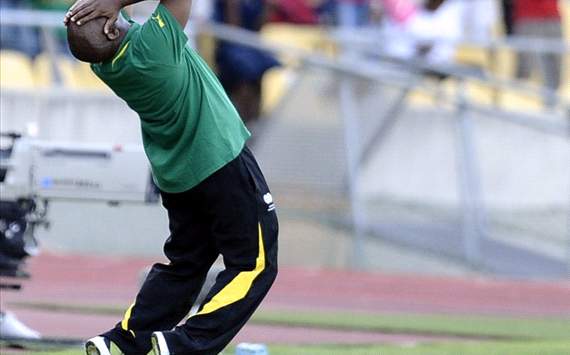
Guest post by Mohlomi Maubane
The Germans regularly find a way to excel in tournaments and are among the favourites to win the Euros in Poland/Ukraine. The South African football fraternity would do well to take a page out of the playbook that produced the current incarnation of Die Manschschaft when appointing a new Bafana Bafana coach. SAFA fired Pitso Mosimane this week after Bafana Bafana could only muster a 1-1 draw against Ethiopia in a 2014 World Cup qualifier in Rustenburg.
Eight years ago, the German national team was in dire straits after failing to win a single match in the group stages of the 2004 Euros. A rebirth seemed inevitable, and the newly appointed technical team of Jürgen Klinsmann and Joachim Löw pursued it with typical German precision.
Their first step was to give Die Manschschaft a new identity. The duo settled on a style based on playing the ball on the ground and transitioning swiftly from defence to attack. This was the outcome of an extensive consultation process. Workshops were held with German coaches and players to inquire how they wanted to play and how they wanted to be seen to be playing by their fans (and international ones too). Members of the German public also enjoyed the opportunity to provide input on how they wanted the national side to play.
From this inclusive process, Klinsmann and Löw drafted a curriculum for German football that was presented to the Bundesliga and the German FA. The latter then pressured teams in the former to build academy programmes that adhered to the overall strategy. Bundesliga teams were also encouraged to adopt a fitness programme that enabled the philosophy to be implemented. The newly appointed Under-21 coach also had to abide by the new policy.
Tag: development
What’s in a shoe?
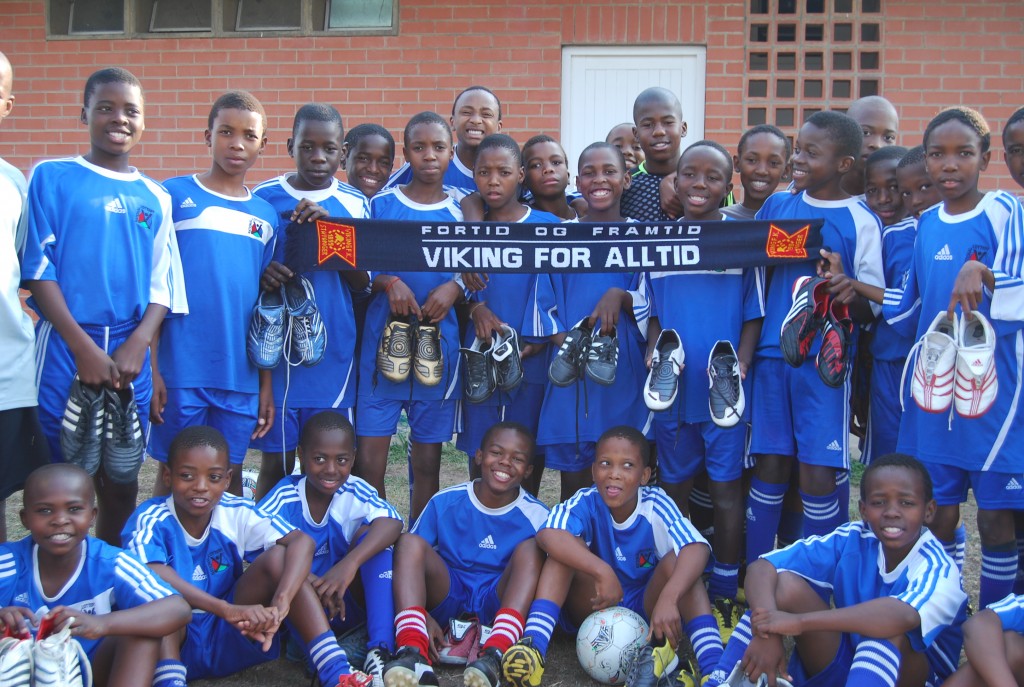
From black high-cut steel-toe boots with leather studs to light, laceless pink boots with titanium studs, the history of football shoes is a journey from pain to pleasure.
Outside Europe and North America, however, millions of young players from working poor families cannot experience that special feeling of slipping on a fine pair of ‘real’ football boots. That is why this week’s generous gift of high quality boots from Viking Stavanger FC in Norway brought such joy to the boys of the Izichwe Youth Football program in Pietermaritzburg, KwaZulu-Natal.
Izichwe has also been invited to Norway for a major international tournament in May 2011. The solidarity of Viking (est. 1899) is doing a lot to open up opportunities for this terrific group of young South Africans.
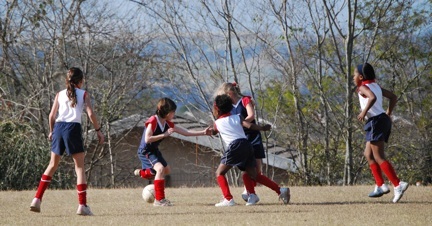
Remember ‘Feel it! It is here!’ and similar emotional tugs on our football-loving hearts and souls during the 2010 World Cup? A few weeks later, the country is due to host the CAF African Women’s Championship and the silence is deafening.
Media, the South African FA, government and the private sector are back to their usual ways, ignoring everything but the money-spinning elite men’s game. The most recent evidence of the continuing low status of the women’s game in South Africa (and Africa) is that the venues for the African Women’s Championship in October have yet to be decided.
After the World Cup, we are back to reality. Maladministration, commercial disinterest, and male condescension continue to hold African women’s football back. The more things change, the more they stay the same.
Race, Class and SA Football
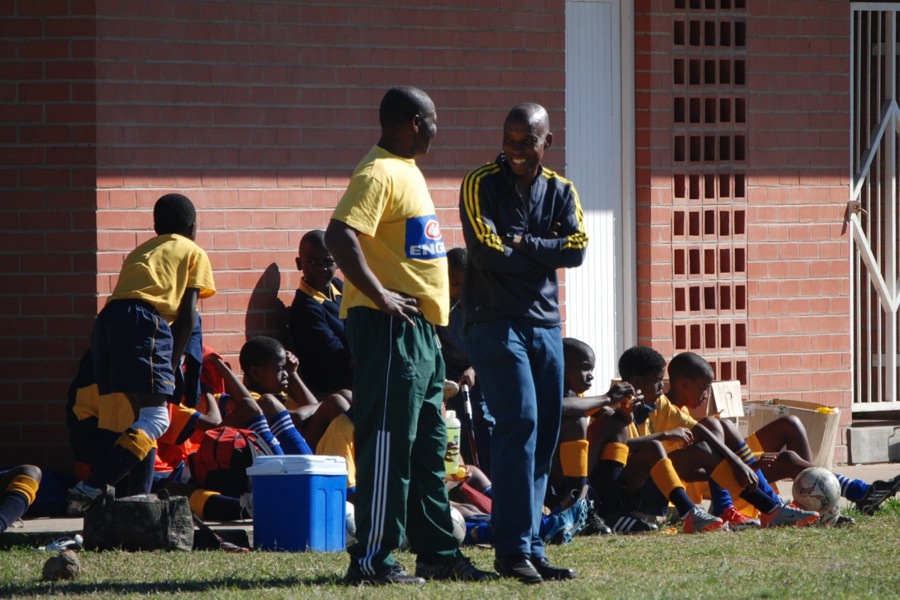
‘Talking Football’ by Thabo Dladla (Echo, 5 August 2010)
The euphoria and excitement that grew around football during the recent World Cup are not likely to boost the beautiful game in South Africa. If our attitudes do not change towards this predominantly black sport, it will remain a stepchild of South African sport for many years to come.
Rugby and cricket will continue to receive support from businesses and decision makers. The black elites’ children attend private and formerly white high schools which promote rugby and cricket . . . [codes] which enjoy the best sporting facilities, all the way up to university level. The few facilities available to football are either poorly maintained or not maintained at all.
The system continues to support the rich and politically powerful. there are many black faces leading institutions such as schools, universities, municipalities and government departments, and yet football continues to struggle.
At university level rugby enjoys huge sponsorship and coverage on television while football [does] not despite the huge number of students who play the game . . . The young men and women in this age group should be competing in U20 and U23 competitions. The Izichwe Youth programme based at the University of KwaZulu-Natal strives to address some of the challenges faced by the needy youth.[The program receives support from Ilawu B.B., National Lottery, Metropolitan, Adidas and Viking Stavanger FC in Norway.]
The rich and powerful call for more police and prisons. Yet the country requires youth programmes to empower our youngsters socially, economically and academically, to shape their future. I would like to see a change in attitude from those who make decisions in government and business.
It is not only the rugby-playing children from middle class families who have dreams. Patriotism is not only about carrying flags and singing national anthems, it is more about caring and supporting your fellow citizens.
[Click to listen to podcast with Thabo Dladla and fellow coaches.]
Life, Love, and Football in Kenya
In the year of Africa’s World Cup, it’s easy to overlook the host continent’s “other” players. Take these teenage girls in rural Kenya, for example. They organize, manage, referee, and play football in the Moving the Goalposts program. But this is not just about the game. Health education and social support are vital components of Moving the Goalposts.
Parents in Kilifi District have embraced the project: “But I have one problem in my house with Mbeyu [her daughter] and this issue of football,” says the mother of one of the players. “If she comes home from the football field and they have won, we’ll hear the whole story, how she scored, we’ll all laugh, the whole house will know. . . . But if they have lost, ha, Mbeyu—she’ll be ill and the whole house will be ill! . . . If she’s lost, there no laughter in the house.” (Read more of the girls’ stories in Sarah Forde’s gripping book Playing by Their Rules.)
African Media and the World Cup
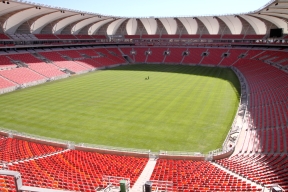
The 2009 Highway Africa Conference, held recently at Port Elizabeth’s new World Cup stadium (photo above), helped African media be better prepared to cover the 2010 World Cup, according to Guy Berger, head of Rhodes University’s School of Journalism and Media Studies. African media should work to ensure that “coverage is not only focused on the glitz and glamour aspect of the World Cup,” Berger said, “but must be extended to critical evaluation of socioeconomic consequences.”
In a keynote address, Saleem Badat, Rhodes University Vice-Chancellor and licensed football coach, cautioned African journalists against uncritical reporting: “As a supposedly African event, it remains to be seen how, in what ways, and to what extent the media coverage of the 2010 FIFA World Cup will differ from that of previous World Cups.”